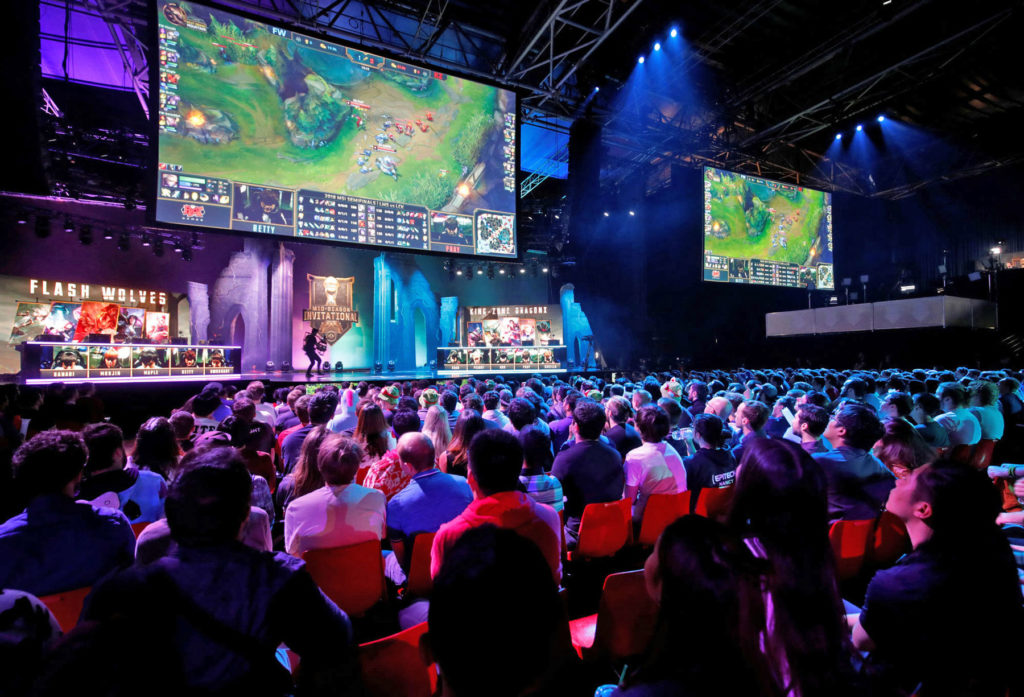Why eSports Is Gearing Up to Be the Largest Sport in History

Gaming has come a long way and we are not just talking about how well titles have improved over the past decades. As an industry and as a hobby, gaming is now more accepted than ever before and this entertainment media goes beyond kids spending dimes in an arcade. It has become so popular, that competitive gaming itself has become a profession already.
Electronic sports or better known as Esports is a form of competitive gaming. Most commonly, these tournaments or competitions are organized by esteemed bodies who are willing to put up millions in the prize pool to entice the best of the best to come out and play. Esports in and of itself has come a long way already and it’s always a joy looking at its glorious climb to fame.
The Rise Of Competitive Gaming
The common misconception is that Esports has only been around in the past decades or so. However, the truth is that it has been around since the early 70s. The first officially recorded video game competition was held at Stanford University on Oct. 19, 1972. The tournament called for the best Spacewar players in the university. It was simpler times then as the top prize was a year’s subscription to Rolling Stone magazine.
Then by 1980, the next major video game competition was held and it was none other than the acclaimed Space Invaders Championship which had over 10,000 participants. This event put gaming and competitive gaming under the limelight but it is still a far cry from what we have today.
Thanks to the unparalleled success of the Space Invaders Championship, more organizers stepped up to hold massive tournaments of their own. It was also that same year when Twin Galaxies was formed. It was an organization that focused mainly on keeping track of the video game records worldwide.
During the 80s, competitive gaming really began to soar thanks to the increasing popularity of arcades. Although these aren’t competitions per se, kids, teens and adults alike flocked arcades to get the top score on popular titles such as Pac-Man and the original Donkey Kong. Back then, there was no bigger prize than having your name at the no. 1 spot of the high-score rankings.
The following years was the start of the renaissance era in gaming. Arcades were still popular but they were well on their way out because of the emergence of better home consoles that put quality gaming on TV sets in households nationwide. Some of the significant releases at the time was the original NES in 1985, the Sega Genesis in 1989, and the Super NES in 1991.
These releases were helpful not only for competitive gaming but for the entire industry as well. Games were improving and the technology behind them was becoming more powerful. In a domino effect, the increasing quality of titles made games more popular, and this set the stage for the reemergence of large-scale gaming competitions, starting with the Nintendo World Championships in 1990.
Years later, more organizations were formed to support the budding industry, one of which was the Professional Gamers League, Cyberathlete Professional League, and Quakecon. These organizations moved above and beyond Nintendo consoles and they began featuring PC games, which at the time, was on the rise as well. That along with internet connectivity making online battles possible, helped competitive gaming to once again get into a new era.
In May 1997, one of the first true Esports competition was held and this was Red Annihilation, which starred the competitive first-person shooter (FPS) Quake. There were over 2000 participants in the event and the number was whittled down via one-on-one battles. When 16 players were left, they were flown to Atlanta, Georgia to compete during the Electronic Entertainment Expo (E3). This time around, the prize was no longer a measly magazine subscription. It instead was a pre-owned Ferrari 328 GTS.
In the following years, PC and Nintendo games dominated the competitive scene. Some of the most popular titles at the time were Counter-Strike, Warcraft, Starcraft, and Nintendo’s Super Smash Bros. series. Of course, we can’t talk about competitive gaming without including the Evolution Championship Series (EVO) which featured fighting games like Street Fighter and others.
Just when people thought the peak was already there, Esports once again broke through. Thanks heavily to online streaming platform Twitch, Esports tournaments became more accessible, Fans no longer had to buy plane tickets to watch their favorite players go head-to-head in a display of skill and quick hands.
The rise of massive online battle arena (MOBA) titles like DOTA 2 and League of Legends, was primarily responsible for introducing more gamers into competitive gaming. The big leagues as people would call it became the goal of many aspiring gamers worldwide.
As Esports began drawing more and more fans worldwide, companies and organizations began seeing the profit to be made in competitive gaming. Prize pools reached beyond millions of dollars. During this stellar rise, countries began supporting competitive gamers and it has since become a profession.
The developers themselves have begun supporting their competitive scene. One great example of this is with Blizzard’s hero-based competitive FPS, Overwatch. The Overwatch League was announced in 2016 and its first event was launched last year. It featured sponsored teams from all over the globe including the Atlanta Reigns, Philadelphia Fusion, Seoul Dynasty, and Guangzhou Charge.
Due to the popularity of Overwatch, the professional league was an instant hit. Aside from Twitch and other streaming platforms, the games were also broadcasted on Disney XD.
What’s Next For E-Sports?
If there is one takeaway from its decades worth of history, it’s that competitive gaming is progressive. Regardless of what hurdles there may be, it will go above and beyond it to reach to a broader audience. Once again, it seems like it may have peaked now but there are bigger things ahead for ESports and it has easily become a shoe in as the largest sport in history.
In a summit by the International Olympic Committee (IOC) in Oct. 2017, the organization acknowledged the popularity of the industry and it concluded that it could be considered as one of the events in future Olympic Games. Leaders in Japan are also fighting to push ESports into becoming a part of the 2020 Olympic Games in Tokyo but so far, it hasn’t been confirmed. While Olympic Games inclusion may still be far off, ESports is already a part of another major sporting event.
It was announced last November that ESports will be a part of the 2019 Southeast Asian (SEA) Games to be held in the Philippines. This is historic for the industry as it will be the first time it will be included in a major sporting event. The games considered as part of the event was DOTA 2, Starcraft 2, Tekken 7, Mobile Legends and Arena of Valor.
That being said, Esports is set to become one of the largest sports the world has seen. It already has a cult following worldwide and all that’s left is the implementation of rules and regulations that other major sports have. Once these have been laid, then we might officially see it as a part of the Olympic Games.
Perhaps the true reason why Esports could be the largest sport in history is that it is more accessible. Not everyone was born with physical advantages but everyone is born with enhanceable reflexes and gaming skills. That being said, everyone has the opportunity to participate in competitive gaming. From the looks of things, it seems like Esports is far from dying off or even slowing down.









